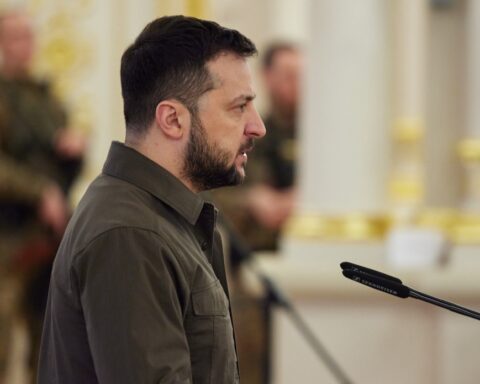WASHINGTON/KYIV — Combined, Enerkon’s planned three-gigawatt solar project in the disaster zone around the defunct nuclear power plant — which is also to produce hydrogen fuel for export when completed — and a 5G network would require nearly $2 billion in investment, its CEO said. By comparison, the country received total foreign investment of about $3 billion in 2019.
Remarkably, the story appeared to receive no coverage in the Ukrainian press.
An Enerkon press release on March 5 announcing that its CEO, Benjamin Ballout, had registered under the U.S. Justice Department’s Foreign Agents Registration Act (FARA) to lobby for Ukrainian Deputy Prime Minister Oleh Uruskiy during the official’s upcoming trip to the United States, also received little media attention in Ukraine.

In the release, Ballout said he would be organizing a series of business meetings for Uruskiy — with whom the American businessman had been in touch regarding the two deals. Ballout said the deputy prime minister would meet with such firms as Cisco Systems, Nokia, Erickson, and SpaceX, the rocket company owned by billionaire Elon Musk, in an effort to help advance 5G in the country.
The silence that met the blockbuster announcements contrasted with an audible buzz among a raucous group of penny-stock traders who follow Enerkon’s share price, which has skyrocketed by as much as 3,400 percent since November in part on expectations of a Ukraine deal.
While the shares have pulled back from a high of $2.09, as of March 23 they were up almost 900 percent since Enerkon first announced the talks, at $0.59 — a price that put Ballout’s net worth, at least on paper, at nearly $20 million.
Some investors on popular online stock discussion sites have voiced suspicion about the deal with Ukraine and claim Enerkon is seeking to inflate the price of its shares with false press releases so that insiders can sell shares at a high price, an illegal practice known as “pump and dump.”
Enerkon bulls — market players who have expressed optimism about the company and its shares — accuse the naysayers of seeking to make money the opposite way: by selling shares they don’t own and driving down the stock price with negative comments. Such short sellers, as they are called, make money by buying back the shares at a lower price and pocketing the difference.
In a phone call with RFE/RL on March 9 and during a webinar with investors on March 15, Ballout reiterated that he had signed a memorandum of understanding with the Ukrainian government and denied any stock manipulation.

In response to a query, however, Uruskiy’s office sent RFE/RL a letter signed by the deputy prime minister stating that he had “no information” about any cooperation between the Ukrainian government and Enerkon. Uruskiy, who oversees “strategic” industries, said that solar and telecom projects are not part of his mandate. The Energy Ministry also told RFE/RL it had no information about Enerkon’s solar project, and the Ministry of Digital Transformation said it had held no negotiations with Enerkon concerning 5G projects.
Serhiy Kostyuk, head of the state agency responsible for the “exclusion zone” around Chernobyl, the site of the nuclear disaster in April 1986, told RFE/RL that Enerkon’s Ukrainian partner Anatoliy Ryazantsev spoke with him only on March 10 — weeks after the press release of a deal was announced — – to express interest in an alternative energy project in the region. Kostyuk said his office is waiting for the company’s presentation.
Ambitious Plans
As RFE/RL reporters called Ukrainian officials to seek confirmation or comment on the agreements described in the press releases, Ballout began to threaten them, accusing a Washington-based reporter and a Kyiv-based reporter of spying.
“You and your crew under big scrutiny now. U can’t ever spy on me to a foreign gov and get away with it,” he texted on March 22.
In a March 14 e-mail to U.S. and Ukrainian officials, including Ukrainian police, Ballout asked them to open a criminal investigation into the reporters for spreading Russian disinformation and seeking to damage relations between Washington and Kyiv.
Ballout is just the latest U.S.-registered lobbyist for Ukraine in recent years to spark intrigue.
Marcus Cohen, an American lawyer, hired Signal Group Consulting in 2019 to lobby on behalf of President Volodymyr Zelenskiy, whose administration denied any connection to the effort.
A year earlier, a Delaware-registered company hired another Washington-based firm to lobby on behalf of presidential candidate Yulia Tymoshenko, who also denied any connection to the initiative.
‘Rather Far-fetched’
In his March 5 press release, Ballout said that American Ukraine Green Energy and Telecommunications Holdings — a joint venture between Enerkon and Ryazantsev, registered in the state of Wyoming — had signed a memorandum of understanding (MOU) with the Ukrainian government on the solar energy and 5G projects.
“Our now signed MOU gives us great optimism and motivation towards the final [Engineering, Procurement, and Construction] contract Agreements and engagements,” said the statement, which is filled with grammatical errors and erratic punctuation, making the precise meaning of some of its claims difficult to decipher.
Ukrainian and foreign business executives expressed bewilderment, saying that the scale and timing of the projects described seemed ambitious or unrealistic.
“The announced projects have raised eyebrows and seem rather far-fetched within the current environment,” the American Chamber of Commerce in Kyiv told RFE/RL in a statement, pointing out that Ukraine is still focused on developing the older generation of mobile technology known as 4G.
No tender for 5G frequencies is expected until December 2021 at the earliest. A significant portion of Ukraine is not yet covered by 4G, and few people in the nation of 44 million can afford 5G phones.
Kateryna Pavlova, a former head of the state agency overseeing the Chernobyl disaster zone, said there are substantial technical hurdles to the energy project, which would require a sufficient amount of flat land with existing infrastructure, such as transmission lines and transformers, to handle three-gigawatt output.
“There is no hope for implementation of the project,” she told RFE/RL.
World’s Largest Solar Plant?
Enerkon’s Chernobyl project would be nearly 40 percent larger than the 2.2 GW solar plant completed last year in China’s remote Qinghai Province, which is currently the world’s biggest.
Players in Ukraine’s alternative energy industry also said it’s a terrible time to move ahead with any solar energy project in the country, especially one so large.
The Ukrainian government last year reneged on its investment contracts with alternative energy producers and slashed tariffs, causing upheaval.
Ballout showed RFE/RL a copy of the February letter he received from Uruskiy’s office that he claims “awarded” Enerkon the two deals.
While he redacted part of the original letter due to what he said were privacy concerns, it appeared to be nothing more than a polite acknowledgement: Uruskiy thanked the U.S. businessman for his investment proposal, saying it aligns with Ukraine’s vision of its own economic development.
In the official statement to RFE/RL, the deputy prime minister’s office said that Ballout had reached out regarding the projects but denied that Uruskiy had signed any memorandums of understanding.
The deputy prime minister’s office also denied that Ballout would be setting up any meetings in the United States for Uruskiy, a former Ukrainian space agency chief who has headed the Ministry for Strategic Industries since its creation in July 2020.
Who Is Benjamin Ballout?
Ballout’s LinkedIn page describes his main employment over the past decade as managing director of Diplomatic Trade, a “multinational corporation represents (sic) government in Trade, Liaisons, and Lobbying with an Executive experience bringing in over Twenty years of experience in various industries.”
Before this year, Ballout — who emigrated to the U.S. state of Michigan from Lebanon — had never registered to represent a foreign government under FARA, and he does not appear on congressional records as a lobbyist for domestic or foreign corporations.
Michigan records show that Ballout had registered several businesses in the state in the 2000s prior to launching Diplomatic Trade, including Royal Valet and Fromaggio Pizza. He filed for personal bankruptcy twice, most recently in 2011, when he racked up $300,000 in debt, including business loans.
Ballout founded Enerkon in 2016, and two years later announced his company was purchasing a solar-energy asset worth $40 million in a stock transaction.
Today, Ballout claims the company has solar projects in several countries, including a 500-megawatt development in Mozambique.
Mozambique’s current installed solar capacity is about 60 megawatts, according to media reports, which would likely make Enerkon’s project the African nation’s largest.
RFE/RL was unable to find any mention of such a project in media reports and other on-line resources.
“I don’t have any reference of such [a] company,” Marcelina Joel, the director of legal affairs at Mozambique’s Ministry of Mineral Resources and Energy, said when contacted by RFE/RL through social media.
Enerkon is a penny stock whose shares trade on the over-the-counter market for companies that do not meet the listing requirements to trade on a formal exchange, such as multiple years of audited financial reports.
Red Flags
Enerkon’s 2020 annual report shows revenues of $40 million and a cash cushion as of December 31 of $17.5 million.
Brenda Hamilton, a Florida-based securities lawyer at Hamilton & Associates Law Group, said that Enerkon’s financial statements raise many red flags, pointing out that Ballout prepared the earning statements himself, which is not a common practice for a publicly traded company, and that they were not audited by a third party.
She also pointed out that Enerkon tweeted a version of the FARA filing that differs from the one on the Justice Department’s website.
The Short Form registration document on the Justice Department’s website simply states Ballout will render services for the Ukrainian government.
The one he retweeted states the company is the lead contractor and financial manager for a telecommunications project and will be inviting a major U.S. partner into the project.
“It is clear to us that the information being disseminated to the public about Enerkon contains false and misleading information,” Hamilton, who has analyzed the filings of hundreds of penny stocks over the years, told RFE/RL after looking through the company’s financial reports and press releases.
Some stock investors became suspicious of Enerkon when — after the company’s share price skyrocketed earlier this year amid talk of a Ukraine deal — they realized it was registered at a modest house in Florida rather than an office building. The company headquarters now has an address on Madison Avenue in New York City.
They also found fault with the company’s website design and its lack of information about its overseas projects.
As the questions mounted, Ballout held webinars to give investors more information. During the March 15 online conference, Ballout was joined by a man he introduced as Dr. Henry King, whom he described as an “economist and consultant.” King discussed the two projects in Ukraine at length.
RFE/RL could not find anyone with that name and profession online. A man with a voice that sounded like King’s had identified himself during a call with RFE/RL days earlier as Richard Cohen, Ballout’s legal counsel.
Ukraine Connection
In his press releases and communications with investors, Ballout described Ryazantsev, his partner in American Ukraine Green Energy and Telecommunications Holdings, as the CEO of Ukrainian Capital Bank as well as the director of UkrDorZvyazok, the state-owned company that services the telecommunications network used by road maintenance crews.
When contacted by RFE/RL, Ryazantsev said that he had never been CEO of the bank but had been a shareholder in the past. Ukrainian central bank records show that Ryazantsev’s family owned about 10 percent until 2015.
Ryazantsev told RFE/RL he would soon be joining UkrDorZvyazok as a deputy director.
According to Ballout’s March 5 press release, UkrDorZvyazok is the partner of American Ukraine Green Energy and Telecommunications Holdings in the 5G project. However, UkrDorZvyazok director-general, Viktor Bondar, told RFE/RL there were no plans to hire Ryazantsev or to roll out a 5G network.
Ryazantsev told RFE/RL he was introduced to Ballout through mutual acquaintances and helped virtually introduce the American businessman to Uruskiy.
Uruskiy is expected to travel to the United States in the coming weeks to discuss the nation’s defense industry, which Washington is pushing Kyiv to reform. The agenda is being organized by the U.S. Embassy in Kyiv. An embassy spokesman, Daniel Langenkamp, said that Ballout’s companies were not involved.
Nonetheless, Enerkon investors were again told during the March 15 call that Ballout is organizing a meeting for Uruskiy with representatives of SpaceX in Washington.
Ballout showed RFE/RL a photo of a letter he sent to Patricia Cooper, SpaceX’s vice president of government affairs in Washington, as proof he is involved. Neither Cooper nor SpaceX’s press department responded to requests for comment.
In his letter to U.S. and Ukrainian officials, Ballout asked law enforcement to “arrest and interrogate” RFE/RL reporters researching this story, alleging — among other things — that they are “attempting to damage Billion USD Commercial relations between our company and the Government of the Ukraine.”






